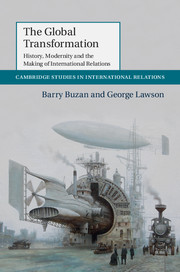Book contents
- Frontmatter
- Dedication
- Contents
- List of Figures
- List of Tables
- Preface
- List of Abbreviations
- Introduction
- Part I The Global Transformation and IR
- Part II The Making of Modern International Relations
- Part III Implications
- 9 From ‘Centred Globalism’ to ‘Decentred Globalism’
- 10 Rethinking International Relations
- Bibliography
- Index
9 - From ‘Centred Globalism’ to ‘Decentred Globalism’
Published online by Cambridge University Press: 05 February 2015
- Frontmatter
- Dedication
- Contents
- List of Figures
- List of Tables
- Preface
- List of Abbreviations
- Introduction
- Part I The Global Transformation and IR
- Part II The Making of Modern International Relations
- Part III Implications
- 9 From ‘Centred Globalism’ to ‘Decentred Globalism’
- 10 Rethinking International Relations
- Bibliography
- Index
Summary
Introduction
We have argued that contemporary international order can be seen largely, although not completely, in terms of the downstream consequences of the configuration of power that fuelled global modernity. This argument implies that historical momentum (or ‘path dependency’ in more formal expression) matters a great deal to how the contemporary world is organized. Historical momentum represents an array of often contradictory events and does not infer an ability to predict the future. Human affairs are both complex and contingent – they are the quintessential ‘open system’. Historical development is also subject to unpredictable, random events. Just think of the Cuban missile crisis, or what would happen if celestial mechanics pushed a large asteroid in our direction, or if machine intelligence emerged out of the geometric increases in computing power. The scope for human agency, random events and non-linear interactions is extensive.
Although we are not, therefore, in the predictions business, we do want to look forward and consider how the main vectors of the global transformation could play out. Some of the themes we have highlighted in earlier chapters are about change (e.g. the closing gap between core and periphery), while others are about continuity (e.g. the destabilizing impact of technological change on great power military relations). As developed in Chapters 6 and 7, we see three main stages within the global transformation to date. The first stage was Western-colonial international society, which lasted from the late eighteenth century until c.1945. The second stage was Western-global international society, which lasted from the end of the Second World War until the first decade of the twenty-first century. Both of these stages represented forms of centred globalism, with ‘centred’ meaning that development was highly uneven, with a mainly Western core dominant, and ‘globalism’ meaning that international order was combined on a planetary scale. Our label for the third stage of global modernity is decentred globalism. ‘Decentred’ refers to the ways in which the configuration that marks the global transformation is no longer concentrated in a small group of states, but is increasingly dispersed. Globalism marks both a basic continuity and an intensification of earlier phases of the global transformation in which the configuration of modernity assumes planetary scale. In the contemporary world, the mode of power that underpinned global modernity is both less unevenly concentrated and more combined than in previous stages of global modernity.
- Type
- Chapter
- Information
- The Global TransformationHistory, Modernity and the Making of International Relations, pp. 273 - 304Publisher: Cambridge University PressPrint publication year: 2015
- 1
- Cited by



